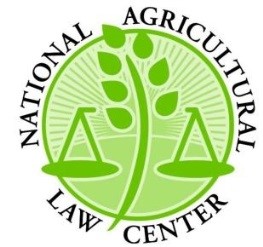A comprehensive summary of today’s judicial, legislative, and regulatory developments in agriculture and food. Email important additions to: camarigg at uark.edu
ANNOUNCEMENT: Join us TODAY at 12 noon (ET) for an Agricultural & Food Law Consortium webinar: Legal Checkup on Checkoffs: Recent & Emerging Legal Issues in Federal & State Checkoff Programs. Sign-in details available here.
JUDICIAL: Includes labeling, zoning, and inverse condemnation issues.
In Robin Reese, Plaintiff, v. Odwalla, Inc., et al., Defendants. No. 13-cv-00947-YGR, 2017 WL 565095 (N.D. Cal. Feb. 13, 2017), plaintiff sued claiming defendants’ product labels, using the term “evaporated cane juice,” do not comply with the requirements of the federal Food, Drug, and Cosmetics Act (FDCA), as adopted by the California Sherman Food, Drug, and Cosmetic Law. Defendants moved to dismiss claiming California Sherman Law incorporates only binding FDA food labeling regulations, “of which there was none at the time of the alleged violations.” Defendants argued FDA’s 2009 Draft Guidance was not binding here. Court reasoned that plaintiff claimed that previous regulations “already made it illegal for defendants to label the ingredients in their product as evaporated cane juice rather than ‘sugar.’” Defendants’ motion to dismiss denied.
In Flat Rock Wind, LLC, Appellant-Petitioner, v. Rush County Area Board of Zoning Appeals, Appellee-Respondent, and Daniel Sprinkle, et al., Appellees-Intervening Respondents, No. 70A01-1606-PL-1382, 2017 WL 586487 (Ind. Ct. App. Feb. 14, 2017), a wind energy company sued claiming zoning board “exceeded its authority by creating a new, extended Setback Condition,” and by changing a prescribed method for measuring setbacks. Court observed that, “In interpreting the Zoning Ordinance, the [defendant] viewed the siting setback as a ‘minimum’ guideline, which was subject to ‘reasonable restrictions’ to preserve the health and safety of the public.” Court found zoning board’s interpretation of the ordinance was “reasonable” and that the board “imposed the Setback Condition to promote the Zoning Ordinance’s and the WECS’ special exception’s stated purpose to promote the public interest.” Trial court decision for zoning board affirmed.
Jack Samuel Plumb and Jennifer Plumb, Plaintiffs, v. Salt Lake County and Skyview Excavation & Grading, Inc., Defendants, No. 2:13–cv–1113 CW, 2017 WL 568304 (D. Utah Feb. 13, 2017) involved an award of attorney fees in an inverse condemnation suit. Defendants argued requested attorney fee “is not proportional to the complexity of the issues litigated and should be ‘drastically’ reduced,” describing the case as a “relatively uncomplicated inverse condemnation claim.” They also contended the Uniform Relocation Assistance and Real Property Acquisition Policies Act “does not allow the prevailing party in an inverse condemnation [action] to recover expenses incurred prior to the filing of the lawsuit.” Plaintiffs argued the inverse condemnation claim “was not simple and was the most contested legal issue in the trial.” They also argued the results achieved “significantly exceeded the amount offered by the County” at mediation before trial. Plaintiffs’ motion for attorney fees granted.
REGULATORY:
ENVIRONMENTAL PROTECTION AGENCY: Rule establishes a tolerance for residues of thiamethoxam in or on bananas. Details here.
